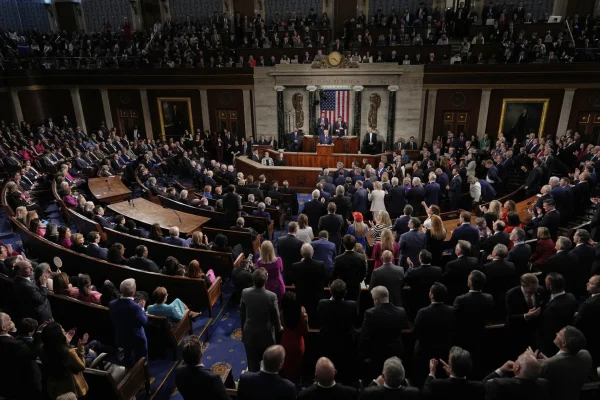The Award for Inclusivity Goes To…
The positive and negative effects of some awards shows going gender-neutral
Some awards shows are considering going completely gender-neutral to be more inclusive towards gender non-conforming actors, but this could lead to fewer opportunities for women to be nominated and win.
Awards shows are known for their drama — from Kanye West interrupting Taylor Swift at the 2009 VMAs to the La La Land/Moonlight mix-up at the 2017 Oscars to Will Smith slapping Chris Rock at the 2022 Oscars — but now, a controversy is brewing off-stage. Performers’ and fans’ increasing calls to remove gendered categories leave awards shows with a decision to make.
The idea of including categories that aren’t determined by gender isn’t new — the Grammys adopted this system in 2011, and the MTV Movie and TV Awards followed suit in 2017. But a recent gain in widespread media and public attention might pressure more ceremonies, especially high-profile ones such as the Oscars, Emmys, and Golden Globes, to adapt. Yet, these recent changes, or lack thereof, only lead to more questions and considerations, especially regarding why this shift in the entertainment industry is happening and what its effects could be.
“I don’t think the categories are inclusive enough at the moment,” acknowledged actor Emma Corrin in an interview with the BBC, summarizing the main point of advocates for non-gendered categories. Corrin, a non-binary actor best known for playing Princess Diana in The Crown, expressed, “It’s difficult for me at the moment trying to justify in my head being non-binary and being nominated in female categories.”
Rather than nominate performers in female or male categories, some awards shows have combined the two, allowing all performers, regardless of gender, to be nominated for the same award. This usually involves replacing dual categories (such as “Best Actress” and “Best Actor”) with one (simply “Best Actor”). Sometimes this will mean the new category has more nominees or even multiple winners to ensure that just as many people are given a chance to participate as if they were two awards.
The MTV Movie and Music Awards is one such show to make the shift to genderless awards, which they have accommodated by including the categories for “Best Performance In a Movie” and “Best Performance In a Show.” The former included nominees Lady Gaga (House of Gucci), Robert Pattinson (The Batman), Sandra Bullock (The Lost City), Timothée Chalamet (Dune), and winner Tom Holland (Spider-Man: No Way Home) in 2022.
Corrin is not the only actor calling for more inclusivity in awards shows. In 2017, after being asked which category they preferred to be entered in for an Emmy submission, actor Asia Kate Dillon (known for their roles in Billions and Orange Is the New Black) explained in a letter to the Television Academy that they are “someone who experiences their gender identity as falling outside the boxes of ‘man’ and ‘woman.’” In response, the Academy replied that “any performer can submit in any category,” according to Dillon, although the gendered categories remained.
But inclusivity isn’t the only consideration to take into account. Riley Brunson (‘25), one of the leaders of the Bishop’s FEM Club, thinks that women and men should be able to compete against each other because of the message that those nominated are equals, whereas having different categories can perpetuate the idea that there is a difference in skill between the genders.
However, some fear that combining the male and female categories could result in less equality, rather than more. Gender disparity between men and women is a very real issue in Hollywood, and there is no guarantee that women would be nominated and rewarded for their work as much as men if they were judged together. The Center for the Study of Women in Television and Film found that, in 2021, men outnumbered women onscreen by a factor of two to one, and women only made up 31 percent of lone protagonists, 35 percent of major characters, and 34 percent of speaking characters.
According to a UCLA film report, only 25 percent of films that won in any category at the 2021 Oscars had a female lead, begging the question: if there are no separate categories for women and men, what will prevent men from winning all of the time? After all, more male lead actors (and a general bias towards men in the film industry) leads to more nominations, which leads to more wins. And if men are the ones winning awards, what will prevent the public from simply thinking they are better than their female counterparts?
This is a worry that Riley shared, saying that “competing together runs the risk of male dominance in the categories” because “there’s a lot of biases within the media.” She elaborated that prejudice against women could potentially impact who is chosen as the winner, and added that she didn’t want women to be overlooked because of their gender.
Josh Welsh, the president of Film Independent (which organizes the Spirit Awards), agreed that this is an issue, but did not think it is an issue that can be solved by excluding people. In an interview with the Los Angeles Times he said that “keeping gendered award categories is not a solution to the problem. The change needs to come with diversifying the gatekeepers who make decisions about what films and shows get financed and marketed.”
While there may not be a clear solution, Emma Corrin put it best when they said, “It’s about everyone being able to feel acknowledged and represented.” And although this may not be interpreted in the same way by everyone, it is a sentiment that should be considered in any conversation about inclusivity in awards shows, and, simply, in life.

Lucy is a senior and Lead Content Editor for The Tower. This is her fourth year on the staff and second on the editorial team, and she can’t wait to...












